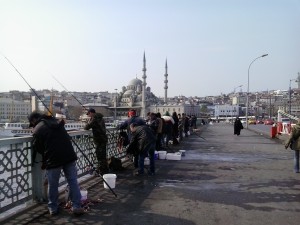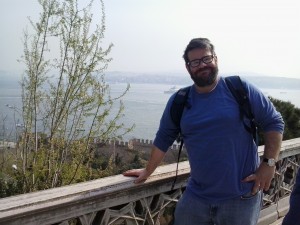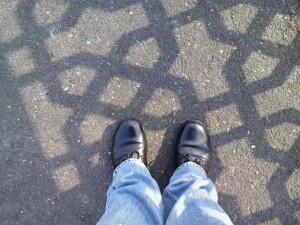Wednesday, 8:30 am. I am walking across the Galata Bridge, basking in a rare moment of almost quiet as I cross the Golden Horn. The Galata Tower, my objective this morning, stands at the top of an enormous hill (of course) in the distance.
The scene is peaceful, a thing which I have come to realize is as much a commodity in Istanbul as food and water. The sun is shining, the birds hover above the three dozen fishermen who stand at the rail and drop lines into the water 40 feet below. The simit peddlers push their carts and the shoe polishers have set up their squat stations all along the river and on the bridge.
A shoe polisher crosses my path, carrying his tool chest/foot stand. As he passes, a brush drops off of it to the ground in front of me. Instinctively I pick it up and call to him. He accepts it with realization, then a huge smile, and offers me a shoe shine in the shade of one of the pillars. I take him up on the offer, thus extending this moment of peace.
In ten seconds he has related most of his life story, whose abridged version involves ten children, three ex-wives, and two imminent, major surgeries. Surely, I am going to be asked to pay for one of them.
My moment of peace has ended.
I have come to realize that the hustle never begins or ends in Istanbul, it always exists. Everyone is selling something and the city is intense and clamorous. Istanbul is always on the move, the Turks always doing something. There is always traffic. There is the constant sound of construction, the ubiquitous chatter of people and vehicles. There is very little respite from this clatter, though we manage to steal moments of solitude in our hotel rooms and in the breezy corners of the Hagia Sofia and the Topkapi Palace.
There are districts to the city. Unlike Prague’s districts, Istanbul’s districts seem to be organized by the main source of merchandise offered in the area. We realized this in what must have been the plumbing district, where every shop on this street had the same selection of bathroom sinks, piping, washers, spigots, buckets, and toilet tanks. In the last two days we have been through the electronics district, the fast food district, the book district, the stationary district, and the live animal district.
And then there are the people working at those shops. The Turks: intense, industrious, warm, extroverted to a restraining order degree, hawk-eyed for a customer and an unfamiliar face. It’s as though we are at a convention with 14 million insurance salesmen high on PCP. Every time we pass a shop, a man pops out like a Jack-in-the-box and offers his wares with total energy and zero restraint. Some call to us, “how can I take your money today?” Others follow us down the block, shooting off a list of services and merchandise as we try to escape. To stop at a restaurant and peep at a menu is to set out the beacon call: I desire something. And we are covered in employees and hawkers before we can read a word. It is fascinating and it is exhausting.
To the consternation of my colleague, the Turks seem drawn to me. I am asked, “where you from?” so many times a day that I have changed my answer to “the Czech Republic,” in the hopes that it might save me the six minutes of politely refusing whatever they are selling. This worked once and I walked away with grand relief. But every time I’ve tried this method since, the man talking to me has smiled and said, “Ahoj!” and then “Ježíš Maria!” and I’ve muttered an exasperated “Sakra.” Damn.
This is twice as astounding coming from the Czech Republic as the Czechs take the exact opposite approach to sales. They hang back, lean on something, and often exhibit irritation should you decide to buy something at their shop. Czech waiters usually pray that potential customers choose another restaurant. Turkish waiters would self immolate to get you through their door and not the place next door.
And I suppose that’s why my exasperation with the Turkish personality eventually becomes admiration. The people want to work and that is what they do. They are never sedentary, never with idle hands. Restaurants might have ten employees and three customers, but not one of those employees is at a loss for a task. They are cleaning silverware, scrubbing the underside of tables, fixing a crooked picture or a wobbly table. The Turks must be the most industrious people I have ever laid eyes on and though it can be irritating at times, this impresses the hell out me.
My shoe polisher is no different. He wants a lot more money from me than any shoe polish should demand. Though he does a bang up job, he does not get the 40 Turkish Lira (400 Kc, $20) he asks for, but five TL. Still, he doesn’t want money for nothing, he wants to work for this money. This is typical of the street hawker. They want your money and they’ll do anything to get more of it, but they will work for it. Nothing is beneath them and no matter the job you see Turks doing – making kebabs, cleaning gutters, polishing silverware – they do it conscientiously, with determination and with pride. I saw no Turkish men asking for handouts.
6 pm. I am walking back across the Galata Bridge towards my hotel. The Yeni Cami (the New Mosque) stands in the distance, probably the same birds hover above a different set of fishermen. My day has been long and I am tired. With a strange sense of déjà vu I spot several more shoe polishers, all of whom “accidentally” drop brushes in front of tourists. Damn. I laugh hard and loud, the way you do when you got beat and you know it.
A shoe polisher crosses my path, a brush drops from his case. I step over it and walk past. Looking back, the shoe polisher is looking to see if I have picked up his brush. I point at him and laugh. He smiles too and offers a shoe polish.
“Ne děkuju,” I say.
“Ahoj!” he says.
“Sakra.”




#1 by Mary Widdicks on April 16, 2014 - 4:56 pm
My husband had this happen to him in Chicago once! But the shoe shiner did a terrible job of polishing and a much better job of intimidating…so he got paid $20 for his services. Wait…we might have just been mugged. Hmm.